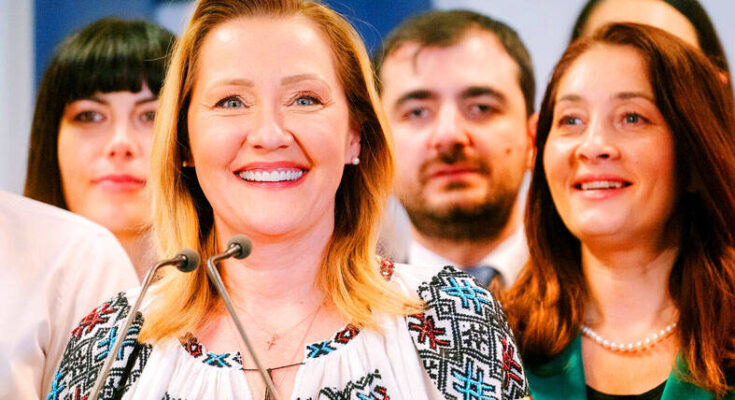FRAGMENTED PARLIAMENT: The pro-European PSD was leading other parties with 23.5% of the vote, but all the far-right parties combined stood at more than 30%
AFP, BUCHAREST
Romania’s ruling Social Democrats (PSD) were set to win Sunday’s parliamentary elections, while the far-right secured big gains, partial results showed, deepening uncertainty in the NATO nation rocked by political chaos.
With more than 96 percent of the ballots counted, the pro-European PSD — which has governed with the Liberals — was leading other parties with 23.5 percent of the vote. However, all the far-right parties combined stood at more than 30 percent, significantly up from the less than 10 percent they received in the previous vote in 2020.
The parliamentary poll comes at a time of political turmoil sparked when a top court ordered a recount of the first round of Romania’s presidential election the previous Sunday.

Elena Lasconi, leader of the USR party and presidential candidate, front, speaks at a news conference at the party’s headquarters in Bucharest on Sunday.
Photo: Bloomberg
That ballot was won by Calin Georgescu, a little-known far-right admirer of Russian President Vladimir Putin. A runoff is scheduled for Sunday.
The far-right’s surprise success has raised fears in the West that it could potentially herald a shift in the foreign policy of the NATO nation and EU member, which borders Ukraine, but political analyst Cristian Pirvulescu said the vote failed to provide “clear” answers.
“It’s really an extraordinarily fragmented parliament, with a lot of risks,” he said, as the outcome could make negotiations to form a government difficult.
“It is an important signal that Romanians have sent to the political class,” Romanian Prime Minister Marcel Ciolacu said.
Ciolacu said that the nation should continue on its European path, while stressing that “protecting our identity, national values and faith” are equally important.
Voter turnout reached its highest level in 20 years at more than 52 percent.
Romania’s far-right parties — which oppose sending aid to Ukraine — welcomed the results.
“Today the Romanian people voted for the pro-sovereignty forces,” said George Simion, leader of the far-right AUR party, which was on 17.9 percent of the vote.
“It is the beginning of a new era in which the Romanian people reclaim the right to decide their own destiny,” he said.
The extreme-right SOS Romania party, led by firebrand Diana Sosoaca, and the recently founded Party of Young People, each had more than 5 percent of the vote and were expected to enter parliament.
Since the fall of communism in 1989, the nation of 19 million has never seen such a breakthrough by the far-right, but anger over soaring inflation and fears of being dragged into Russia’s war in neighboring Ukraine have mounted.
“The sharp rise of the far-right, [grabbing] up to a third of the votes,” mirrors the accumulated frustrations in society, as well as “economic discontent,” political commentator Radu Magdin said.
However, short of allies to govern with, the far-right might still end up on the sidelines.
Faced with a fragmented parliament, several political leaders have said they would try to shore up support for a pro-European “government of national unity.”
“United we can do wonders,” Elena Lasconi, the leader of the centrist USR — which had 11.6 percent, according to the partial results — told supporters.
Lasconi, who placed second in the first round of the presidential ballot, said the political parties should set aside their differences after the recent turmoil to defend “democracy in Romania, staying in the European Union and in NATO.”
Earlier on Sunday, some voters such as Dorina Burcea had voiced concern that Romania might turn away from its pro-European path.
“As someone who lived a little bit under communism and still remembers it — and at the same time could enjoy all this openness of the European Union, to be able to go to other countries — I can’t imagine how we could have another option than the EU and NATO,” the 41-year-old said.
The parliamentary election took place at a delicate time, with the top court’s order to recount the ballots of the first round of the presidential election causing widespread confusion.



